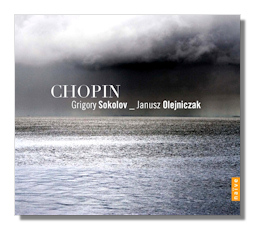
The Internet's Premier Classical Music Source
Related Links
- Chopin Reviews
- Latest Reviews
- More Reviews
-
By Composer
-
Collections
DVD & Blu-ray
Books
Concert Reviews
Articles/Interviews
Software
Audio
Search Amazon
Recommended Links
Site News
 CD Review
CD Review
Frédéric Chopin

- Sonata for Piano #2 "Funeral March", Op. 35 *
- 24 Preludes, Op. 28 *
- 12 Etudes, Op. 25 *
- Mazurkas, Op. 7/1-5
- Mazurkas, Op. 17/1-4
- Mazurkas, Op. 24/1-4
- Mazurkas, Op. 30/1-4
- Mazurka, Op. 41/2
- Mazurka, Op. 67/4
- Mazurkas, Op. 68/1-4
- 2 Polonaises, Op. 26
- 2 Polonaises, Op. 40
- 3 Polonaises, Op. 71
- Polonaise "Heroic", Op. 53
* Grigory Sokolov, piano
Janusz Olejniczak, piano
Naïve OP30494 4CDs
Also available separately -
Naïve OP30456:
Amazon
- UK
- Germany
- Canada
- France
- Japan
- ArkivMusic
- CD Universe
and Naïve OP20002:
Amazon
- UK
- Germany
- Canada
- France
- Japan
- ArkivMusic
- CD Universe
In one respect this is a curious release: the album notes give copious information on Russian virtuoso Grigory Sokolov but nothing on the relatively little-known Janusz Olejniczak. Some buyers might purchase the attractive box housing the two double-CD jewel cases and conclude Olejniczak, with that unfamiliar and somewhat feminine-sounding first name, is a female pianist, since there isn't even a picture of him on the accompanying materials. (Sokolov graces the cover of his album booklet.) Olejniczak was born in Poland in 1952 and while his name may not be known to many, his hands are: he appeared in the 2002 Academy Award-winning film, The Pianist, supplying his hands for certain shots in the performance of various works by Chopin. More importantly, he was the actual performer throughout the film as well. Olejniczak also had the lead in the 1991 film The Blue Note, portraying Chopin, no less. It should be noted too that certain Chopin mavens have been aware of Olejniczak the pianist for some years now. Many consider him one of the finest Chopin interpreters of his generation, both from his recordings and concerts.
Olejniczak is a sensitive artist who generally offers somewhat understated but thoroughly convincing performances here. His Polonaises are tasteful, imaginative and beautifully rendered. The Polonaise Militaire is played with restrained dynamics for the most part, giving the piece a bit more of a playful character than is usual. Clearly, this is not what Chopin intended, but it succeeds brilliantly: for once this work doesn't sound so bombastic or sophomorically heroic. Speaking of "heroic" the Polonaise in A Flat, the "Heroic", gets a splendid reading as well: here you notice the other dominant aspect in Olejniczak's style – elegance. In fact, most of these performances, the Mazurkas included, exude elegance and restraint in the most tasteful way: dynamics are never fulsome but feature all manner of shadings and nuance, while rubato is always intelligently employed and tempos are consistently well judged. Both the Polonaises and Mazurkas are beautifully rendered and among the best performances one can obtain. The sound is good, the recordings dating to 1991 and 1999. I presume the Polonaises were recorded first, as they appear on the first disc, but the accompanying materials are not clear on this.
Normally, I would describe Sokolov as a fairly straightforward interpreter, but this is my first exposure to his Chopin and he is anything but straightforward, at least in the opening Prelude. Marked Agitato, it is played with much rubato and a broken sense of flow. Not that his performance sounds bad – in fact it's fully convincing in its roiling emotions and the feeling of frustration…and agitation. The Fourth Prelude (Largo) is played beautifully, with a real sense of sadness and rejection, producing the kind of mood Chopin in his dark moments loved to wallow in. The bright and sprightly #5 (Molto Allegro) provides nice contrast in Sokolov's hands and, all in all, the entire set is well played.
On disc one Sokolov plays the famous Second Sonata, giving it a powerful and agitated character: the first movement is dramatic, while the second is nervous and unsettling, and the third appropriately dark and somber but ever stately, and the finale ghostly and threateningly out of control. The Etudes are well played too: #3 (Allegro) is robust in its deftly-wrought muscular bounce, and in #5 (Vivace Piu lento) Sokolov finds a mixture of the vivacious and the elegant, and, plumbing the depths, of tenderness and letdown. Again, this must be counted among the better sets.
There have been many fine Chopin interpreters over the years, among whom I would list Rubinstein, Cliburn, Ashkenazy, Zimerman and Kissin, to name but a few. Sokolov and Olejniczak might well qualify for consideration among the elite in Chopin interpretation, and this four-disc set is testament to that judgment. Recommended.
Copyright © 2010, Robert Cummings




















